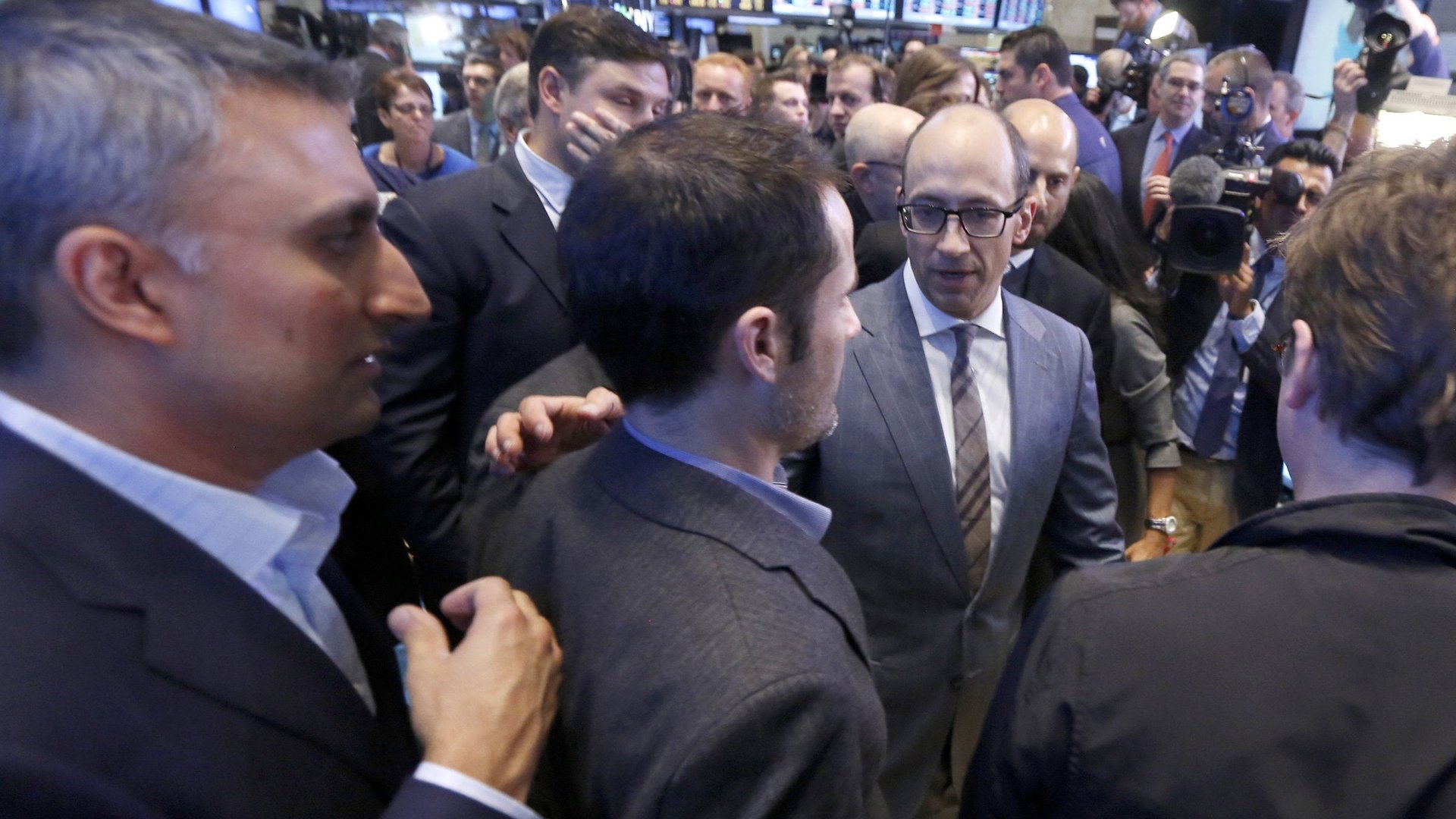NYSE’s courtship of Twitter began nearly three years ago
In American football terms, today was like the Super Bowl of financial markets. Which is fitting, because the man in charge of Twitter’s IPO, Goldman Sachs’s co-head of global technology, media and telecommunications investment banking, Anthony Noto, used to work for the US National Football League.


In American football terms, today was like the Super Bowl of financial markets. Which is fitting, because the man in charge of Twitter’s IPO, Goldman Sachs’s co-head of global technology, media and telecommunications investment banking, Anthony Noto, used to work for the US National Football League.
Noto was among the beaming throng of faces on the floor of the New York Stock Exchange as Twitter shares debuted some 80% above their IPO price, valuing the still loss-making social media network above a staggering $30 billion. Nearby were Twitter co-founders Jack Dorsey, Evan Williams and Biz Stone, who despite an unseemly rift, were presenting a united front and could hardly contain their glee.
Twitter’s IPO was important for many reasons. Among them is its impact on the NYSE itself, as America’s oldest stock exchange continues a fierce battle for business against the Nasdaq, which has traditionally been the destination for technology companies once they decide to list on the stock market.
A jubilant NYSE CEO Duncan Niederauer provided some insight into how it outfoxed its rival in the battle for flagship tech listings:
“I’m asked by a lot of your peers in the media, how did you woo them? What did you give them? We have been a partner with Twitter for two or three years now, because that’s our model. Our model is meet the company, find out what makes them tick, find out how we can help them and finally find ways to partner way before they are contemplating a decision that culminated in their debut today. Of course we are proud of it,” he said.
For Niederauer, the IPO day began with the ritual meeting between NYSE executives and those from the firm going public, in the boardroom on the executive floor of the storied Wall Street building. ”We had a nice time together this morning before it all got heated down here,” he said. “I said to [Twitter CEO] Dick [Costolo] that was the longest interview I have seen on CNBC not by a co-host. He was on TV for a really long time. Clearly it was a big focus. He and the team were very complimentary, and the feeling’s mutual, they were a great team to work with and you saw it all come together today.”
Scott Cutler, NYSE’s head of global markets, was also present in the boardroom for the celebratory meet and greet. “I have no idea if they were nervous. You couldn’t tell it they were. They were so cool, clam and collected, which is great. I think they have a lot of belief in their own platform and their story,” he said of Twitter’s top brass. ”It’s cool and its fun to see them enjoy that and experience this very iconic process of capitalism.”
The contrasts with Facebook’s listing on Nasdaq last year couldn’t be more pronounced. The Morgan Stanley-led IPO suffered from an embarrassing software glitch. With the exchange’s systems overwhelmed by incoming orders, trades couldn’t be processed for hours. And to cap things off, shares in the bigger social network sank 11% from their IPO price.
Throughout Twitter’s IPO process, the company seemed to make a conscious effort to avoid the missteps of Facebook—both mechanically and cosmetically. Whereas Mark Zuckberberg was front-and-center in Facebook’s bell ringing ceremony, Twitter chose an unusual triumvirate of its users to commence its proceedings: Vivienne Harr, a 9-year-old lemonade purveyor with some 23,000 followers, Cheryl Fiandaca of the Boston Police force, and Patrick Stewart, the former Star Trek actor.
Sidestepping questions about any tensions between Twitter’s founders, Cutler said the social media company crafted its own strategy for how the morning would go. “It’s their call as to how they want to handle this process. I have a lot admiration for how they handled the bell ringing; it’s about the users,” he said.
Twitter’s successful opening, he said, boiled down to the NYSE’s more human approach to trading. “It could have opened at a lot of different prices if you are just letting an algorithm do it. But when you put a judgement into it, you get it right, because you are putting in with the science, some art.”
Twitter’s IPO represents a remarkable upswing in fortunes for the Big Board, which was once the undisputed king of America’s stock exchanges but lost ground to the Nasdaq during the last tech boom of the late 1990s and early 2000s.
“We take a lot of pride in what we have accomplished, specifically in the technology sector. You go back 5 years ago, and we were winning one or two out of every ten technology IPOs. And now we are winning 6 or 7 out of every 10,” Niederauer explained. ”We find that our customers are our salesforce now, the wooing is not really what you guys think it is. We say to a customer: ‘Just call the last 20 companies that have IPO’d then they’ll give you honest unfiltered feedback.'”